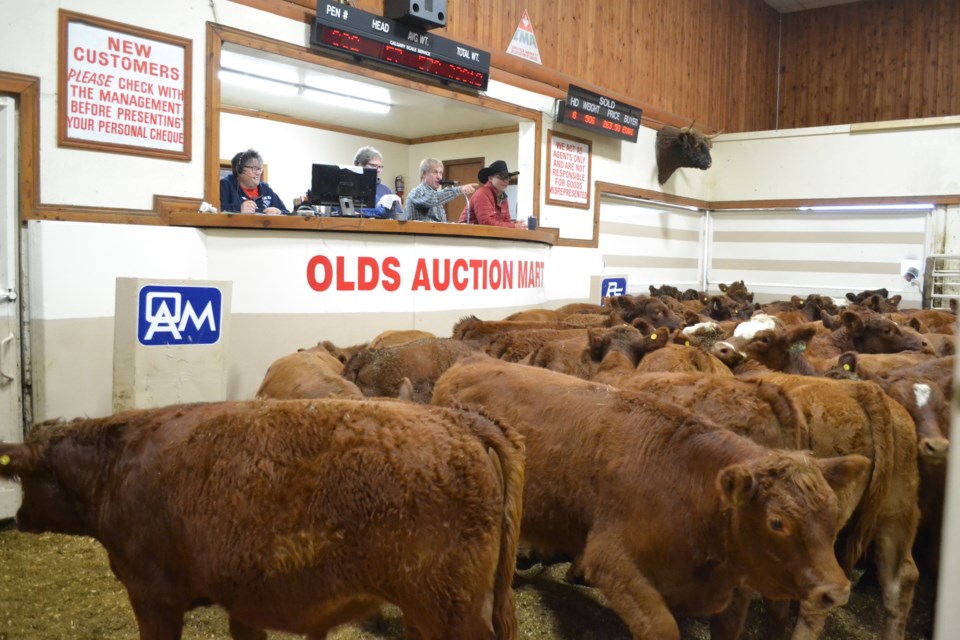OLDS — There’s a future for the livestock marketing industry, but it will likely look a lot different than it does now, panelists said during a Livestock Markets Association of Canada (LMAC) convention in Olds.
The 42nd annual convention of that organization was held May 11-14 at the Pomeroy Inn & Suites. The occasion also marked the 70th anniversary of the Olds Auction Mart.
Those attending a panel discussion May 13 on whether the auction market industry is sustainable were told it will undoubtedly survive, but it’s likely to undergo some mergers and consolidation.
The panel included a couple of Bowden-area residents.
“There are too many auction markets. You’re going to see some closures and mergers,” the crowd was told.
“You can believe this or not, but Walmart has actually made moves at times in the last two years to try to buy Tyson Foods. Walmart is trying to buy Tyson Foods. How is that good for any of us,” Greg Appleyard, president of Strathmore-based Agra-Risk Solutions Inc. said.
His company is an agricultural management and consulting firm specializing in marketing, finance, operations and risk management of livestock and grain commodities.
“Apple sits on $3 trillion, $2 trillion or whatever they do in cash. How do we compete when we have an operating line of $8 million,” Appleyard asked.
“I think we have to evolve with this and somehow try to understand the customer coming out the other end for you to be successful.”
Two Bowden area panelists: feedlot operator Ian Marshall, winner of the outstanding farmer award and Scott Anderson who runs a bred heifer program in the area, had some advice and observations for livestock market operators.
Marshall said from his perspective, the biggest issue feedlot operators like himself have is the cost of vaccinated versus non-vaccinated cattle.
“I think it’s the communication to get the cow/calf producer to do a better job maybe and hopefully get paid for it and also to get that information to the feeder or whoever’s getting the cattle,” Marshall said.
“I don’t know if you could even have days that you strictly sell vaccinated cattle on the market and other days that they’re not.
“I don’t think the producers would like that but I think the buyers or the feedlot owners would darn sure like that and I think they would pay more for it."
Anderson said small producers need the live market.
He said he tends to be pretty picky himself and may not even bid if he doesn’t like what he sees.
In general, Anderson said auction marts are all “outstanding” and “really do look out for the good of the consumer, the cow/calf producer that’s bringing them in.”
He said in most cases, producers bring their cattle to the market closest to them although some will drive to a place they know and trust, even if that means a long drive.
“That truly is a reflection of their trust in that facility,” he said.
Rob Bergevin, general manager of Foothills Auctioneers Inc., believes livestock markets are integral to the communities they’re in.
His company operates in Stavely, about a hour northwest of Lethbridge.
He said for one thing, livestock markets employ very knowledgeable people who can provide their customers with invaluable information on markets and what’s happening in the industry.
“We are our community’s hub for information. The coffee’s always on and these producers are seeking information from us,” he said.
Bergevin said livestock markets also give back in many ways to the communities they’re in.
“I can tell you that I doubt there’s an industry on the planet that’s raised more money for charity than the auction business,” he said.
“We've donated and dedicated a lot of our time to helping people less fortunate than us to raise funds. I think it contributes financial stability to that local town or that local area.
“I know from our personal perspective that Stavely would not be thriving as much as it is now if . . . the market wasn’t there.
“The coffee shop, the hotel, the bar, other places like that certainly see some economic spinoff from the market being there.”
However, those attending the panel discussion were told that the industry is aging and ways need to be found to get more young people into it.



